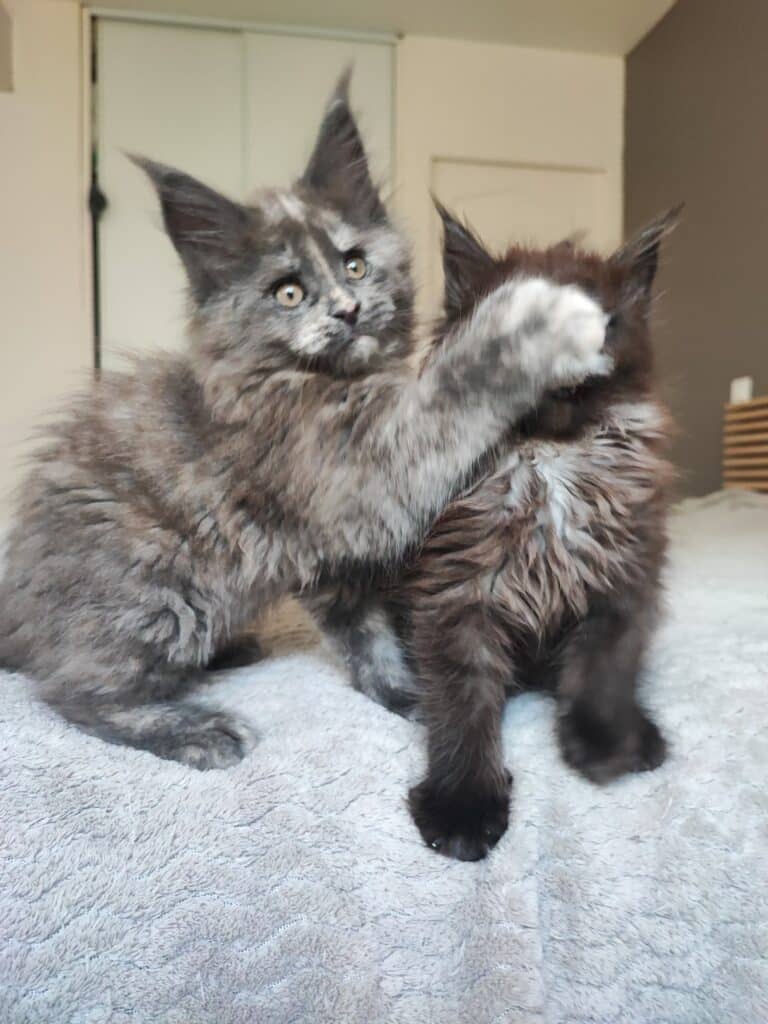How to welcome a maine coon without conflict 😸
Welcoming a maine coon into a new home is an exciting experience, but it’s important to do it in a way that minimises stress and conflict. Here are a few tips to help a cat settle into its new home:
- Prepare a safe space: Before you bring your maine coon home, make sure you’ve prepared a quiet, secure space where it can retreat. This could be a room with a litter tray, food, water and a few toys. Let the cat gradually get used to this space before giving it access to the whole house. You need to let it de-stress and get used to the smells. Spend a lot of time with it, playing, cuddling and eating and it will soon feel at home. 😸
- Introduce slowly: When introducing your maine coon to the house, do it slowly. Start with the prepared room and let him explore at his own pace. Don’t try to force interaction at first.
- Use soothing pheromones: Commercially available soothing pheromone diffusers can help create a relaxing environment for your cat. This can reduce stress and promote a smooth transition.
- Provide hiding places: Cats like to have places to hide. Make sure there are safe hiding places in the house, such as boxes, tunnels or cat trees, where the cat can retreat to when needed.
- Establish a routine: Cats like routine. Try to maintain a regular daily routine of eating, playing and spending time with your coon. This can help create a predictable environment.
- Introduce scents first: If you already have other animals at home, start by exchanging objects containing their scents before physically introducing them. This can help familiarise the animals with each other without direct confrontation.
- Monitor interactions with other animals: If you have other pets, keep a close eye on their initial interactions. Introduce them gradually under supervision to avoid any aggressive behaviour.
- Allow time and patience: Every cat reacts differently to a change of environment. Give them time to adapt and be patient. Don’t force him to interact with you, and let him come to you at his own pace.
- Immune defences go down when your cat is under stress, so I advise you to boost them with supplements (see article on immune defences).
- Consult a vet: If you have any concerns about your maine coon‘s health or behaviour, consult a vet. Some undesirable behaviour may be linked to health problems.
Remember that every cat is unique, and adaptation can vary from one individual to another. By respecting your maine coon ‘s rhythm and providing a positive environment, you maximise the chances of harmonious integration.😺

The 3-month rule is often referred to as a general period during which it can take a cat some time to become fully accustomed to its new home. However, it’s important to note that every cat is unique, and the time it takes to adapt can vary considerably from one individual to another. Some cats adapt quickly, while others may take longer.
Here’s a general approximation of the 3-month rule:
- First week: During this period, the cat may feel anxious and stressed. It is advisable to provide her with a safe, limited space, such as a separate room with everything she needs (litter, food, water, toys). Allow her to explore this area at her own pace.
- Second and third weeks: Gradually extend the cat’s access to other parts of the house, keeping a close eye on him. Continue to maintain a stable routine for food, play and human interaction. Make sure the cat feels secure in its new environment.
- Second and third months: Continue to reinforce positive interactions. Introduce new toys, offer interactive play sessions, and spend quality time with the cat. Observe its behaviour and make sure it is adapting well to living with other animals or family members.
Bear in mind that these stages are flexible, and it’s crucial to respect the cat’s individual rhythm. Some cats may show signs of adapting more quickly, while others may need more time. Be patient, encourage positive behaviour, and provide a stable and secure environment.
If the cat shows signs of prolonged stress, anxiety or abnormal behaviour, it may be worth consulting a vet or cat behaviourist for advice specific to the situation.👨⚕️
If you already have pets, even if they sometimes get on at first sight, most of the time the sudden arrival of a new inhabitant will create stress, fights and problems.
It’s even more important when you already have animals to integrate them gently. ❤️